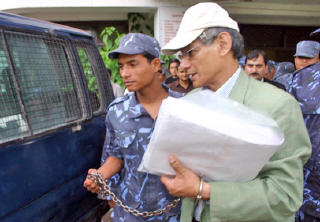
Sobhraj banks on Indian court to bail him out
Kathmandu, Aug 3- With less than a day before he is freed or sentenced to further punishment him by a Nepalese court, Charles Sobhraj, one of the most wanted serial killers in the 1970s, is banking on Indian courts to bail him out.The 61-year-old French national, who was sentenced to 20 years in prison last year by a court here for the murder of an American backpacker three decades ago, is fighting the verdict.The court of appeals will hear the case Thursday and is expected to give its decision.Sobhraj, the son of an Indian tailor and Vietnamese shop girl, spent several years in India in the 70s where he was convicted and jailed for 21 years for manslaughter and robbery in New Delhi's upmarket Ashoka Hotel.However, Sobhraj's lawyers are now banking on a case heard by India's apex court in 1996 to persuade the judges to release him Thursday.The case goes back to the killing of a foreign tourist, Alan Jacob, in a hotel in Varanasi in India's Uttar Pradesh state in 1976.Three people, including a woman, and an Indian, visited Jacob, who had checked into Natraj Hotel in Varanasi, a major pilgrimage town. A bellboy at the hotel told police he was summoned to bring a glass of water.After the visitors left, Jacob was found dead in the room. Police arrested Sobhraj and charged him with the murder in 1982 when the manager of the hotel and the bellboy identified him as one of the three visitors.Police also brought in a handwriting expert who said the signature of one of the foreigners in the hotel's guest registration book resembled Sobhraj's handwriting.The Varanasi hotel case bears an uncanny resemblance to the Kathmandu killing.Nepal police say Sobhraj checked into Kathmandu's oldest luxury hotel Soaltee Crowne Plaza in December 1976, using the passport of a Dutch tourist he had murdered in Bangkok.He signed the guest register as Henricus Bintanja and the signature resembles the handwriting in his bona fide passport, police say. However, Sobhraj says he never came to Nepal before 2003, when he was arrested from a Kathmandu casino and charged with the three-decade-old murder.His lawyers are basing their argument on the Varansi murder in which India's Supreme Court said police did not have enough evidence to convict Sobhraj. The court said the handwriting expert's testimony had to be backed by other indisputable evidence.It also said since the Varanasi hotel manager and bellboy had seen the foreigners only for a moment, they could not be trusted to identify Sobhraj as being one of them six years later.The courts may be in different countries but the legal principles remain the same, Sobhraj's lawyers say.Sobhraj himself too considers the Indian courts to be fair, though he was convicted by one of them."In India, I got a fair trial," he said. "In Nepal, no one called the witnesses, no one allowed me to cross-examine them."
Courtesy:-Indo-Asian News Service
Kathmandu, Aug 3- With less than a day before he is freed or sentenced to further punishment him by a Nepalese court, Charles Sobhraj, one of the most wanted serial killers in the 1970s, is banking on Indian courts to bail him out.The 61-year-old French national, who was sentenced to 20 years in prison last year by a court here for the murder of an American backpacker three decades ago, is fighting the verdict.The court of appeals will hear the case Thursday and is expected to give its decision.Sobhraj, the son of an Indian tailor and Vietnamese shop girl, spent several years in India in the 70s where he was convicted and jailed for 21 years for manslaughter and robbery in New Delhi's upmarket Ashoka Hotel.However, Sobhraj's lawyers are now banking on a case heard by India's apex court in 1996 to persuade the judges to release him Thursday.The case goes back to the killing of a foreign tourist, Alan Jacob, in a hotel in Varanasi in India's Uttar Pradesh state in 1976.Three people, including a woman, and an Indian, visited Jacob, who had checked into Natraj Hotel in Varanasi, a major pilgrimage town. A bellboy at the hotel told police he was summoned to bring a glass of water.After the visitors left, Jacob was found dead in the room. Police arrested Sobhraj and charged him with the murder in 1982 when the manager of the hotel and the bellboy identified him as one of the three visitors.Police also brought in a handwriting expert who said the signature of one of the foreigners in the hotel's guest registration book resembled Sobhraj's handwriting.The Varanasi hotel case bears an uncanny resemblance to the Kathmandu killing.Nepal police say Sobhraj checked into Kathmandu's oldest luxury hotel Soaltee Crowne Plaza in December 1976, using the passport of a Dutch tourist he had murdered in Bangkok.He signed the guest register as Henricus Bintanja and the signature resembles the handwriting in his bona fide passport, police say. However, Sobhraj says he never came to Nepal before 2003, when he was arrested from a Kathmandu casino and charged with the three-decade-old murder.His lawyers are basing their argument on the Varansi murder in which India's Supreme Court said police did not have enough evidence to convict Sobhraj. The court said the handwriting expert's testimony had to be backed by other indisputable evidence.It also said since the Varanasi hotel manager and bellboy had seen the foreigners only for a moment, they could not be trusted to identify Sobhraj as being one of them six years later.The courts may be in different countries but the legal principles remain the same, Sobhraj's lawyers say.Sobhraj himself too considers the Indian courts to be fair, though he was convicted by one of them."In India, I got a fair trial," he said. "In Nepal, no one called the witnesses, no one allowed me to cross-examine them."
Courtesy:-Indo-Asian News Service
No comments:
Post a Comment